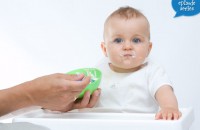The Boob Group
Milk Sharing: Using Milk Banks
[00:00:00]
Please be advised, this transcription was performed from a company independent of New Mommy Media, LLC. As such, translation was required which may alter the accuracy of the transcription.
SUNNY GAULT: This episode of The Boob Group is brought to you by RuminaNursingwear. Hands-free pumping and nursing tanks and bras to support your breastfeeding goals. Visit www.pumpandnurse.com and save 20% with promo code BOOBGROUP20.
[Theme Music]
LEILANI WILDE: When a mother needs to supplement her baby during the baby’s first year, what are her options, one alternative to milk sharing mother to mother is using a milk bank. What exactly do milk banks do? What are the benefits of receiving donor milk from milk banks, what are the concerns, how can you donate your breast milk to a bank and what are the qualifications to do so? Today we’ll explore what to expect when donating and receiving from milk banks. This is The Boob Group.
[Intro/Theme Music]
LEILANI WILDE: Welcome to The Boob Group, broadcasting from the Birth Education Center of San Diego. The Boob Group is you’re weekly, online, on-the-go support group for all things related to breastfeeding. I'm your host, Leilani Wilde, I'm also an IBCLC and owner of Leilani’s Lactation and Doula Services. Thanks for joining us today.
If you enjoy listening to our shows week after week, please tell another breastfeeding mama about us. You can also help other mamas discover us through iTunes by leaving us some honest feedback about the show. Search the Boob Group in iTunes and click on our podcast to rate us and leave a comment.
Now Sunny is going to tell us more about our virtual panelist program.
SUNNY GAULT: Hi everybody, so if you’re not here in our studio where we record, there are a bunch of different ways that you can get involved with our show and I usually talk about the staff that I post on Facebook and Twitter and how you can follow the #BoobGroupVP for more information.
I want to talk about a couple other ways though that you can get involved that you may not know about. If you enter our website which is www.newmommymedia.com, we have a list of experts on the side of the page. You can ask any of those experts any questions you want.
You submit it right through the website, we call it, The Ask the expert segment. And it’s a great way, it can be a breastfeeding question but even if you have a pediatrician question you can see all of the different experts that are willing to answer your questions so that’s a great way. And we do read those responses on the show so other people can benefit from it.
We have a segment called BoobOops! So if you guys have some funny breastfeeding oops stories that are funny that you want to share with other people you can submit for that, we have a new segment called mamahacks! Which is a great way if you have discovered something that helps you in your breastfeeding or your pumping experience, just makes life a little bit more easy something you’ve discovered that you want to pass on to other mamas you can certainly submit those.
And then we’re also always looking to review and discuss different breastfeeding apps out there or apps in general that have helped you with your breastfeeding experience. So real quickly there are just some great ways to participate in the show, you can go to our website for more information and go to the contact link on our website if you actually want to submit for some of these.
You can also call us on our voicemail 619-866-4775 and if you leave a message we’ll actually use your actual voice on the show to read your question or your submission. So again lots of fun ways to get involved with The Boob Group.
[Theme music]
SUNNY GAULT:So before we get started with today’s show, there was this crazy headline that I saw on the internet that I had to bring up. I'm not sure why but there seems to be a lot of stuff happening in the UK with regards to breastfeeding. This one is from the UK.
A young mom by the name of Holly she went to swim with her four month old son Vincent at a public pool and according to Holly she said she was asked to leave her local swimming pool because she was breastfeeding her baby and the lifeguard told her it was unhygienic and it was making the male lifeguards feel very uncomfortable.
And so she was very distraught over this and ended up going and talking to management because she claimed that she had a right to be there and management was actually on Holly’s side. It was one of those situations where they apologized immediately and profusely and gave her one year I think pass free to the pool.
So I think they probably handled it pretty well, you know given what could have happened with this, right. But I'm still shocked, the word unhygienic I mean it just amazes me that there are still people that view it that way and I wanted to get you guys’ take on that and what you thought about this article. So Pauline what do you think?
PAULINE SAKAMOTO: Well I think, you know the story really is about the male employees feeling uncomfortable. It really isn't the mom or the baby or being unhygienic. Certainly in this country and globally we want to make sure that breastfeeding is the cultural norm. and it’s going to take… you know I bet we’ve had a long fight and we’ve been… still working on that, we’re still improving piece by piece and but the term that it’s unhygienic, to whom is it unhygienic?
You know we’re talking about being pool side you know certainly we can look at all the bacteria count on the pool side. But I think this is a really good example where one mother can be a game changer for many moms and I applaud her for going to management basically educating people.
SUNNY GAULT:Isn't breast milk like made of like 80 percent water, anyways. I don’t know the properties exactly but I'm thinking how can it be unhygienic like it’s made of mainly water. Like I don’t get it.
LEILANI WILDE: I mean it’s not even if she was breastfeeding in the pool and if she was, how many kids are peeing in that pool?
SUNNY GAULT:I know what else is in the water by that point, I mean…
LEILANI WILDE: And they consider that sterile so you know…
PAULINE: That’s crazy…
LEILANI WILDE: It is, anything for… you know what though the advantage of having those kinds of articles out there is it gives us an opportunity once again to talk about breastfeeding in public.
SUNNY GAULT:Yeah it does.
LEILANI WILDE: Yeah it’s good.
[Theme Music]
LEILANI WILDE: Today on The Boob Group we’re continuing our discussion on milk sharing in a recent episode we talked about milk sharing from mother to mother. Now we’re going to talk about the process for supplementing with donor milk from the milk banks and learn how we can donate to the milk banks as well. Pauline Sakamoto, the President of Human Milk Bank Association of North America, also the Executive Director of Mother’s Milk Bank and she’s on the Executive Board of the US Breastfeeding Committee in Washington DC is our expert today. Thank you for joining us Pauline and welcome to the show.
PAULINE: Thank you it’s my pleasure.
LEILANI WILDE: Pauline what exactly is a milk bank and what does it do?
PAULINE: Well, the science say mother’s milk bank there is a nonprofit silo when… featuring organizations. It’s a service organization very similar to blood banking but what we deal with is breast milk, and human milk.
The mission of the organization basically is to make sure that all babies have accessibility actually to human milk if mom is unable to provide the milk, we collect and nurse human milk by volunteer moms, we process the milk and we give testing on the mothers actually as well and then distribute the milk, some are office and we distribute to roughly about 110 hospitals, mostly intensive care nurseries in 13 states. But we also provide human milk for the baby that’s in the home that has a prescription for whatever medical reason that they need it or it’s their mom’s supply is low. We try to prepare enough milk so we could make sure that our babies get some milk.
LEILANI WILDE: Okay how safe is it to receive another mom’s milk through the milk bank?
PAULINE: Well you know the mother’s milk bank in San Jose, we are licensed as a tissue bank in California and Maryland. Which tells you we’re shipping milk actually to Maryland. So we saw the same guidelines as all the other tissue banks in California mostly things like you know bone banks, eye banks, skin banks, there eye banks. And then we followed the same regulatory pattern as the other milk banks.
The mother’s milk bank in San Jose, a lot of our screening questions and a lot of the ways that we screen a donor are very mature like and in alignment with the blood banking industry. That being said we test the mother’s blood for viruses and we also test the milk for bacteria levels. But an additional thing we did to the milk is that we pasteurize milk which is a short pretreatment process. And there again it basically tries to keep the milk as much intact as possible where at the same time we’re killing the levels of bacteria in the milk that may be pathogenic to the infant who drinks it.
LEILANI WILDE: And the bacteria that is normally in mom’s breast milk generally speaking what about the antibodies that are supposed to kill off that, is that… are you taking away that when you are processing?
PAULINE: Yeah you know the heat treatment process, there is a lot of live cells in the milk that unfortunately we may lose and you know for the immune property search level IGA we may lose 20 percent of the IGA in the milk with the heat treatment process. And the IGG we may lose 60 percent and IGM we may lose all of it because it’s you know probably heat intolerant.
But in its fact, those values even though they may be a bit compromised after the pasteurization we do have a lot of kids and the research shows that the immune properties in the milk for most antenatal services are still intact and that’s to protect the infant from most common infections, there are infections found in hospitals or infections in the home, that is still even through all the freezing and heating and freezing again it still maintains a good quality of immune properties and of course human milk composition is more than immunity.
I mean it you got the [areole] saccharides that are not affected by heat treatment that if the… one would consider describing breasts if you will for the intestinal track over the years instead it collects you know bacteria and foreign matter out of the baby intestinal track and that’s what poop is basically. It’s all the foreign matter that they thought that these areole saccharides found in the intestinal track.
So we do get those believe it or not prescriptions for children that are immune properties or deficient. And they do quite well on donor milk and increasing their immune properties and so they can fight off the colds and the fluids and whatnot.
So in the process in its human milk basically the nutritional value of the milk is all still intact. In a matter of fact some of the vitamins have depreciated because the heat treatment process will commemorate the items in the milk that may cause a reverse reaction to the vitamin so when we heat out that particular catalyst that attenuates those vitamins in the milk.
So there are a lot of unique things going in the human milk. It is very robust and because we’re feeding infants that are very compromised, basically the one or two pounders in the NICU, we want to make sure, they’re struggling with their own bacteria that they get from the hospital and you know the people around that we don’t want to add additional bacterial packaging and bacterialload in the end.
LEILANI WILDE: And that brings out a good point because you know people want to know the advantage or disadvantage of using mother-to-mother milk, donor milk instead of formula.
PAULINE: Well I think in formula there is no milk (inaudible) and it begins very species-specific grade. So in the formula, cow’s milk formula and otherwise you wouldn’t get the immune property that a child would get through mom’s own milk or donor milk. Let me make it very clear that there is no bank in town, we are all the nonprofit milk banks in the US, in Canada, and our mission is to support mommies to breastfeed.
We want moms, successful moms to breastfeed their own in the event that she can't breastfeed for whatever reason and there are plenty of reasons why sometimes it doesn’t happen. Then we feel that the donor milk is the bridge. So you know there might be a situation where the mom is very stressed out, trying to express milk to her baby in the NICU and it’s just really struggling we feel that it is prudent for the physician to offer donor milk to that infant while the mother is trying to get enough supply up.
The same goes in certain hospitals right now there’s a real movement you know for the older late pre-term instance or the nursery full term instance who’s mom because of medication during a C-section or just a really difficult time emberwing that the mom be given some relief by giving the child donor milk while she continues to get her milk supply out.
We also have clients that for whatever reason you know that the mom can't provide the milk that we would send the milk to the mother’s home. Now all of that milk goes to the home, it’s almost like a drug in California we do require physician prescription and the same quality and the same way that processing that we clean the milk for the NICU babies, we also do that for the older child in the mature milk.
LEILANI WILDE: So is there a difference like when you’re receiving donor milk the age specific as far as receiving do they try and match it with the age of the baby or does it not matter?
PAULINE: We try to actually. It’s a very good question we are always looking, well you can imagine, we’re always looking for pre-term mommy’s milk and it’s surprising to me, it’s always incredibly surprising to me that there are moms who have pre-term babies in the NICU and are quite successful in pumping and expressing milk that they have excess that their children you know the babies can't use.
So they are wonderful. They volunteer their excess milk to us and it’s just a joy to receive it and then be able to provide it to somebody else’s baby who is in the same predicament but cannot get milk and they, I have to say they do really well. I don’t know of any immunologist who not say that they do very well with donor milk.
There is research that shows that it’s much more easily digested, the babies do better, less infection there’s a study that just came out that the hospital that use donor milk actually have lower rates of nephritis and colitis in California. And NAC as it’s commonly know you know the horrific situation for pre-term infant to have because it requires a lot of surgery and it becomes a lot expensive just to get them to the point where they are discharged.
LEILANI WILDE: Can you explain that a little bit more for those parents out there that don’t understand what that is?
PAULINE: Nephritis and colitis, It is a situation when the baby’s internal intestinal track is immature, and so when you put a foreign body or a foreign formula to the intestinal track, there are holes in the lumen and so it creates a situation where the baby can't get rid of the foreign body and ultimately if there’re if this a case because of the prematurity the child intestinal track then becomes a system organic green starts in the intestinal track. It’s a horrific situation.
LEILANI WILDE: When we come back we’ll find out how hospitals provide donor milk from the milk banks for the moms and babies and we’ll also learn more about how you can donate your own milk. We’ll be right back.
[Theme music]
Looking for all-in-one tanks and bras to help you easily transition from bump to baby, Rumina nursingwear’s pump and nurse collection is designed for your unique body to support you breast feeding goals and your busy new lifestyle. Simple hands-free pumping with no additional straps, hooks or Velcro. Comfortable all day support for busy multitasking moms and convenient full skin to skin nursing. Plus Boob Group listeners save 20% with promo code BOOBGROUP20.
Rumina Nursing Wear: simple, comfortable and convenient.
Visit their website at www.pumpandnusre.com and save today.
[Theme music]
LEILANI WILDE: Welcome back to the show, we’re here with Pauline from the Human Milk Bank Association of North America. Pauline do milk banks contract with hospitals to revive the breast milk for their patients?
PAULINE: Sure we absolutely do, and like I was saying earlier we service about 104 to 110 hospitals in 14 states. It is very easy for hospitals to get donor milk. It’s like writing a prescription or putting a work order and we literary ship it overnight express to the hospital, they get it the next morning.
So families who are in the homes, I’d say if it’s a family that’s going home from the NICU experience and the baby is just not transferring to another food source or the mom’s still working on her milk supply we can provide donor milk to the home as well, and that’s shipped overnight express to the mom’s home and it’s all you know shipped frozen in glass bottles.
LEILANI WILDE: And is this prescription covered, it’s covered under the insurance, is that what you were saying before?
PAULINE: Yeah the insurance you know in the HCA the new policy for lactation services that donor milk is actually included in the policy. Where we are right now, and I do need everybody’s help. Where we are right now is that the policy is there, the implementation is slow incoming. So when we get a family it’s literary we take one staffed person working with the insurance company for just that family to get a coverage right now but you can imagine if you have 200 families who are needing donor milk it’s a lot of work working through the insurance companies to get it covered.
I need the public’s help in making sure that insurance companies understand that there is a demand for this, that there’s a great need for this, and you know especially for the kids that are the baby giver in the homes you know it’s a short term typically they are being followed by a physician and they need a prescription and you know hopefully the insurance companies would cover the milk and would certainly go to back with the insurance company.
If they are Medicare, Medicare surprisingly since 1986 has been brave but also very smart. And paying for donor milk in an outpatient setting. It’s not well known. But if the infant has some kind of physical condition that is such as failing to thrive and not able to use any of its food source, Medicare will cover donor milk so that something a lot of people don’t know about but it is true and we go again, our office will go to work with insurance company and making sure it gets covered.
LEILANI WILDE: That’s wonderful, so if a parent is in that situation and maybe they haven’t heard from their provider that milk banks can send them milk, would you guys be their spokesperson as far as helping them get the reimbursement or is it something that they actually have to do on their own?
PAULINE: Usually for insurance companies the physician is the spokesperson or the person who will ask for authorization for the donor milk. We will help, our office will help the physician to get that through the insurance company. We can't be, as the provider, we can't be the first ones to ask. It has to be the physician that is functioning under the insurance plan.
So for us it’s always great when the physicians call us and say what about this donor milk, tell me about it right and how long can you give this child donor milk and how can we keep in contact with each other so that we know that the baby is growing and the donor milk is working which in fact rarely does it not work. I mean I can't, you know I’ve been doing this for 29 years, I was a donor… my daughter is 29, so I’ve been doing this milk banking for 29 years and so I was a donor.
But it’s inevitable almost you know once a week we get a mom who gets donor milk for the first time who’s baby is about two to three months and who’s crying on the phone and saying oh my god Pauline, my baby slept for two hours, this is a child that has not slept she’s been in terrible pain and we started donor milk in less than 24 hours and such a switch in personality of this child.
So a lot of people don’t understand these families really are traumatized by a child that’s just not tolerating anything. And when they start using mom’s milk and donor milk, these babies turn over really quickly to being able to sleep for a couple of hours and a little bit more happier and growing well. So we’re really I don’t think that people really understand that situation know about it but there are many kids who are struggling.
LEILANI WILDE: Are the hospitals limited to the amount of milk they can provide to the family before they leave or can they be sent home with milk or how does that work?
PAULINE: The hospitals, each of the hospitals with their legal staff develope their own policy on who gets milk and who doesn’t. So in the milk bank isn't involved in that. We can give them some examples of policy but it really it’s the hospitals themselves who decide and the decision typically is made by is the baby friendly or not, how much is the cost of the milk to the hospital and also a coverage.
LEILANI WILDE: Pauline what process would a mom need to go through in order to donate, is it, can you just break it down to real simple I mean should she go to the website or what, what can she do?
PAULINE: Right she can go to our website www.mothersmilk.org or they can call a toll free number and it’s 1-877-375-6645 that’s also on our website and it’s really fast and easy and a lot of times we hear people saying that it’s too hard, they tell people it’s too hard, but it really isn't. It’s a brief medical screening over the phone then once it sort of looks like the mom would be a great donor and she’s collecting milk or send her a questionnaire about her medical history and how the baby is doing, we contact their pediatrician an OB because we want to make sure that their doctors know they’re donating milk.
If we need to there’s a small blood test that may need to be done and the mom takes her lab script goes to a lab or one of the blood banks that are affiliated with us, get the test done locally and then we start shipping coolers and milk bags to her home and she just fills that up with the frozen milk and calls FedEx they come that day pick it up, we get it the next morning. And from that time forward for the next six months whenever she calls us, there will be a cooler at her door, pick up and more bags and she can ship it off and it’s very easy.
LEILANI WILDE: Excellent, well thank you so much Pauline for sharing this invaluable information about donating and receiving milk from the milk banks. Boob Group club members our conversation will continue after the end of this show as Pauline will talk about a memorable moment when she helped make a difference in someone else’s life and why she’s so passionate about milk banking. For more information about our Boob Group club, please visit our website at www.newmommymedia.com .
[Theme music]
LEILANI WILDE: So here’s a question from one of our listeners, Megan wrote is there an episode I can listen to about starting your period while nursing, I'm really paranoid about losing my supply and looking for tips to prepare myself. Well Megan we actually don’t have an episode but here is our expert Rose DeVigne-Jackiewicz who is going to answer your question for you.
ROSE DEVIGNE-JACKIEWICZ: Hi Megan, this is Rose DeVigne-Jackiewicz a certified lactation consultant in the outpatient clinic in San Diego. You had some concern about starting your period again and losing your milk supply. Typically if you’re nursing and not having any problem when your period does return the only thing you need to worry about is getting pregnant again because it means that you will most likely fertile now.
However your milk [inaudible] when you start your period, there have been some moms that have shared that the baby noted the slight change in flavor and it’s probably a hormonal shift that after a day or two that revolves.
So during your periods you may have a baby that doesn’t nurse as much as often. Some moms have noticed because of the hormonal shift they feel like there’s a little bit of a decrease for a day or two but once your period has started and your hormones shift back, there shouldn’t be a problem but many women nurse for a long period of time even though they start having their period so it should not cause your milk to dry up if you continue to nurse, so hopefully that’s helpful. Thanks so much, bye bye.
[Theme Music]
LEILANI WILDE: That wraps up our show for today. We appreciate you listening to The Boob Group.
Don’t forget to check out our sister shows:
• Preggie Pals for expecting parents
• Parent Savers for moms and dads with newborns, infants and toddlers
• Twin Talks, for our show with parents of multiples.
Thanks for listening to The Boob Group: “Your judgment-free breastfeeding resource.”
[Disclaimer]
This has been a New Mommy Media production. Information and material contained in this episode are presented for educational purposes only. Statements and opinions expressed in this episode are not necessarily those of New Mommy Media and should not be considered facts. Though information in which areas are related to be accurate, it is not intended to replace or substitute for professional, Medical or advisor care and should not be used for diagnosing or treating health care problem or disease or prescribing any medications. If you have questions or concerns regarding your physical or mental health or the health of your baby, please seek assistance from a qualified health care provider.
SUNNY GAULT: New Mommy Media is expanding our lineup of shows for new and expecting parents. If you have an idea for a new series or if you’re a business or organization interested in joining our network of shows through a co-branded podcast, visit www.NewMommyMedia.com .
[00:29:39]
[END OF AUDIO]











